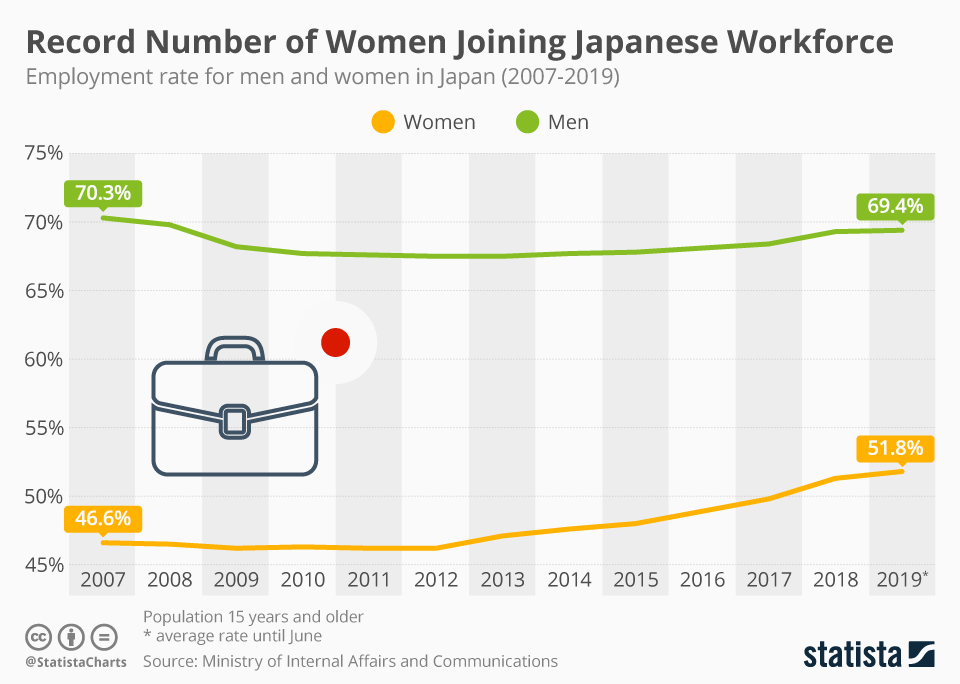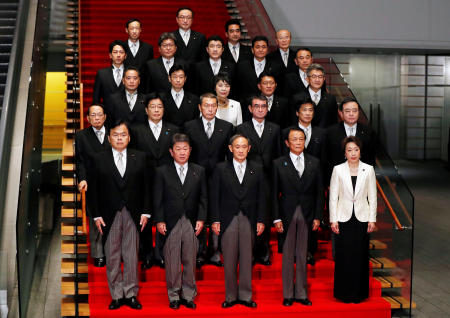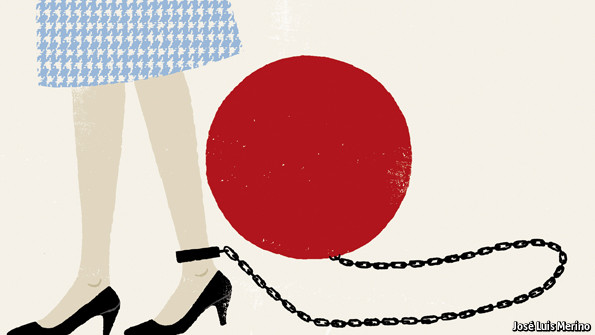By Anna Nguyen,
Japan is one of the most powerful countries in the world as it is the third largest economy, following the United States of America and China. Despite its high ranking regarding their financial status, Japan ranks low in the Global Gender Equality Ranking of the World Economic Forum (121st out of 153 countries). It is surprising to see a developed country amongst the lowest places regarding gender equality in this era. Nonetheless, there have been efforts to eliminate it but the Japanese leadership still has a more conservative point of view regarding the matter. Thus, a new five-year gender equality plan was drafted in the end of December because the desirable target was not reached by the end of 2020.
The most recent attempt to empower women in Japan was firstly introduced in 2013 by the former Prime Minister of Japan, Shinzo Abe under the “Womenomics” policy. The aim was to promote more women to get into the workforce and more specifically in government’s positions. It is worth-mentioning that the Japanese are strongly influenced by the Confucian tradition which emphasizes gender norms and division. Thus, this new policy was quite progressive for them regardless of the criticism that Japan faced by international organizations that fought for gender equality. Precisely, the United Nations Committee on the Elimination of Discrimination against Women expressed their unease regarding Japan’s family system. The fact that the women’s empowering policy was introduced by the Prime Minister encouraged a public discussion about the reasons why women are underrepresented in the Japanese workforce. The most common reason was that the Japanese culture sees very highly of the family values meaning that individuals are expected to put their families’ interests above their personal ones. Therefore, women are anticipated to take care of their families and their houses and resign of their career aspirations.

Due to the fact that the target was not reached, the Japanese government, under the leadership of Mr. Yoshihide Suga, drafted a new plan on late December. The new plan urges for a new society that will not be gender biased by the 2030s. It was disappointing for the Japanese when the initial target of 30 percent of the workforce to be represented by women was not reached, as some people were expecting taking into account the Japanese’s bond to traditions and customs. One of the suggestions included in the plan is the legal revision of the capability of married couples to have different surnames since Japan is one of the fewest countries in the world that does not allow the latter. However, in 2015 the Japanese Court rejected such initiative and stated that “the family system is rooted in the history and culture of each country and international comparisons which ignore it are meaningless”. It is believed that letting women maintain their maiden names can facilitate their career’s evolution while having to change their surnames hinders their success. Nonetheless, the revision of this provision should be carefully examined as such change might have an impact on the sense of family unity. This issue has ignited a tense debate between the ruling party of Japan and the opposition party which stands as an obstacle in the progress of the eradication of the gap between the two genders. Even the Prime Minister who initially showed his support publicly, in an interview on December asked to “take things slowly” regarding this matter seeing his party almost split because of it. Eventually, the plan of the goal’s postponement was adopted in late December but the proposition about the surnames after marriage are still under discussion.

Japan is one of the most advanced and powerful countries in the world and is admired by other countries, still has its flaws and one of them is about the issue of gender equality. Generally, women are underrepresented in the Japanese workforce and especially in the Japanese government. Mr. Suga’s cabinet of 24 members, includes only 2 female ministers. Japan is aware that the target of 30 percent is far from being achieved but are still trying. However, in order to reach any related target, traditions and values have to be re-examined, which is a difficult task to fulfill. It shall not be forgotten that Japan, and Asia in general, sees highly of family values and are somehow more patriarchic. Therefore, this case refers to a radical change of the values’ foundation of the Japanese culture, a process that will take time to finish. Hence, gender equality in Japan is once again postponed.
Bibliography
Garcia, G. (2020). 6 years after Japan launched its “Womenomics” policy is it working? Available here.
Siripala, T. (2020). Japan’s new gender equality policy takes a step back. Available here.
The Japan Times. (2020) Opposition party pushing divided LDP over separate surnames in Japan. Available here.
The Japan Times. (2020). From bad to worse: Japan slides 11 places to 121st in global gender equality ranking. Available here.
Yamaguchi, M. (2020). Japan delays gender equality goals in new 5-year plan. Available here.




